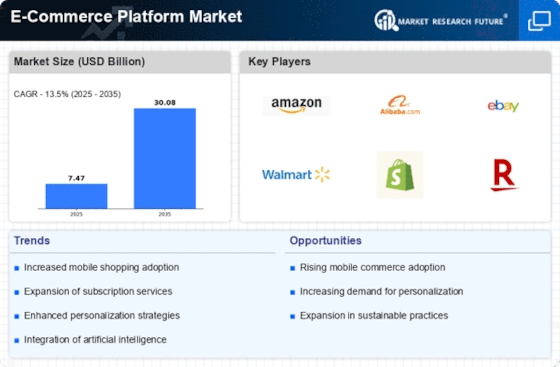Top Industry Leaders in the E-Commerce Platform Market

E-Commerce Platform Market: A Competitive Landscape in Flux
The e-commerce platform market, the digital backbone of online commerce, is a vibrant and ever-evolving space. Fueled by the burgeoning digital economy and changing consumer preferences, it's a battleground for established giants, nimble startups, and everything in between. To navigate this dynamic landscape, understanding the key players, their strategies, and the factors influencing market share is crucial.
Key Players:
- Shopify Inc.
- BigCommerce Pty. Ltd
- Magento
- Yo! Kart
- VTEX
- WooCommerce
- Oracle Corporation
- Miva Inc.
- com
- SAP SE
- Digital River Inc.
- commercetools GmbH
Strategies Adopted by Key Players:
- Shopify: The undisputed leader, Shopify boasts a user-friendly platform, robust app store, and strong scaling capabilities, catering to both small and large businesses. Their strategy focuses on expanding their global footprint, acquiring complementary solutions (e.g., logistics), and fostering a thriving developer ecosystem.
- Magento: The go-to choice for enterprise-level e-commerce, Magento offers extensive customization and scalability, but at the cost of complexity. Adobe's acquisition has fueled investments in AI, cloud integration, and omnichannel experiences, aiming to regain market share from Shopify.
- BigCommerce: A cloud-based platform known for its ease of use and scalability, BigCommerce targets small and medium-sized businesses. Their strategy emphasizes integrations with popular marketplaces and marketing tools, coupled with a focus on mobile-first experiences.
- Salesforce Commerce Cloud: The enterprise arm of Salesforce, Commerce Cloud offers robust CRM integration and powerful marketing tools, catering to large businesses with complex needs. Their strategy focuses on leveraging Salesforce's broader ecosystem and providing data-driven insights to optimize customer journeys.
Factors for Market Share Analysis:
- Target audience: Each platform caters to specific business sizes and industries, with different features and pricing models. Understanding a company's target audience helps assess its competitive positioning.
- Technology stack: The platform's underlying technology, its ease of use, scalability, and integration capabilities play a crucial role in attracting and retaining customers.
- Pricing models: Subscription fees, transaction fees, and app store revenue models all impact a platform's affordability and appeal to different customer segments.
- App store ecosystem: A vibrant app store offering solutions for marketing, logistics, and other critical functions can significantly enhance a platform's value proposition.
- Global reach and localization: The ability to support different languages, currencies, and regulations is essential for capturing international markets.
New and Emerging Players:
- VTEX: A rapidly growing platform gaining traction in Latin America, VTEX offers a headless architecture and strong omnichannel solutions, attracting innovative brands.
- OpenCart: Open-source and highly customizable, OpenCart appeals to tech-savvy businesses seeking flexibility and control over their online presence.
- Headless commerce platforms: These platforms decouple the front-end experience from the back-end, offering greater flexibility and customization for developers and brands.
Current Investment Trends:
- Artificial intelligence (AI): Platforms are integrating AI for personalized product recommendations, chatbots, and fraud detection, improving user experience and efficiency.
- Cloud computing: The shift to cloud-based platforms offers scalability, flexibility, and reduced IT costs, driving market adoption.
- Omnichannel experiences: Integrating online and offline channels through mobile payments, click-and-collect, and loyalty programs is becoming a key differentiator.
- Headless commerce: The growing popularity of headless architectures is reshaping the e-commerce landscape, offering brands greater control over their digital storefronts.
Latest Company Updates:
E-commerce platforms are now the go-to method for manufacturers, brands, and retailers to introduce and evaluate new items in 2023. The proliferation of services related to delivery, warehousing, and payment has increased the appeal of online platforms as a means of reaching a larger consumer base. The success of an online product launch, however, depends on choosing which e-commerce platform to collaborate with.
A group of top executives has been hired by The Aditya Birla Group to lead its digital platform project for construction materials in 2023. Overseeing the business-to-business (B2B) endeavour will be Grasim Industries, the conglomerate's flagship company.
The e-commerce platform Shopify introduced Shopify Magic in 2023, a service that provides companies with free access to robust AI tools. During its most recent Summer 23 Edition event, the eCommerce platform announced the debut and detailed the features of the new toolkit. Shopify Magic's primary feature is Sidekick, an AI-powered assistant, however development is still underway. Similar to ChatGPT, businesses can employ Sidekick by creating prompts that will guide the software's responses.










